人教版九年级英语超级笔记(全一册)
人教初中英语九年级全一册知识点归纳总结
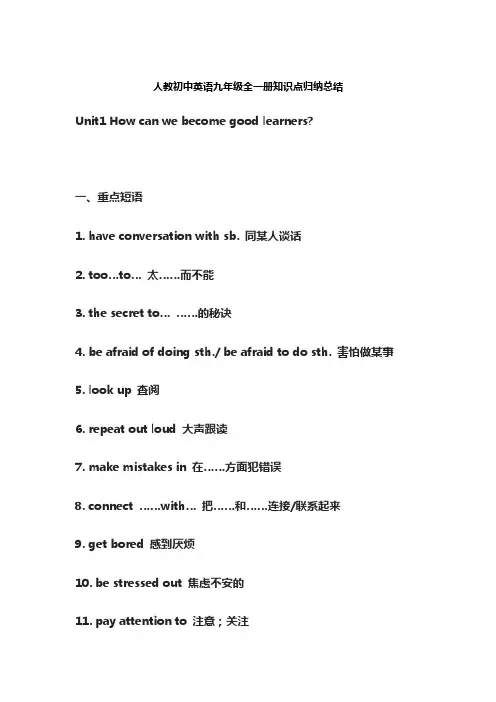
人教初中英语九年级全一册知识点归纳总结Unit1 How can we become good learners?一、重点短语1. have conversation with sb. 同某人谈话2. too…to…太……而不能3. the secret to………的秘诀4. be afraid of doing sth./ be afraid to do sth. 害怕做某事5. look up 查阅6. repeat out loud 大声跟读7. make mistakes in 在……方面犯错误8. connect ……with…把……和……连接/联系起来9. get bored 感到厌烦10. be stressed out 焦虑不安的11. pay attention to 注意;关注12. depend on 取决于;依靠13. the ability to do sth.. 做某事的能力二、考点详解1. by + doing 通过……方式(by是介词,后面要跟动名词,也就是动词的ing形式)2. talk about 谈论,议论,讨论The students often talk about movie after class. 学生们常常在课后讨论电影。
talk to sb= talk with sb 与某人说话3. 提建议的句子:①What/ how about +doing sth.? 做…怎么样?(about后面要用动词的ing形式,这一点考试考的比较多)如:What/ How about going shopping?②Why don't you + do sth.? 你为什么不做…?如:Why don't you go shopping?③Why not + do sth. ? 为什么不做…?如:Why not go shopping?④Let's + do sth. 让我们做…...吧。
九年级英语全一册笔记整理
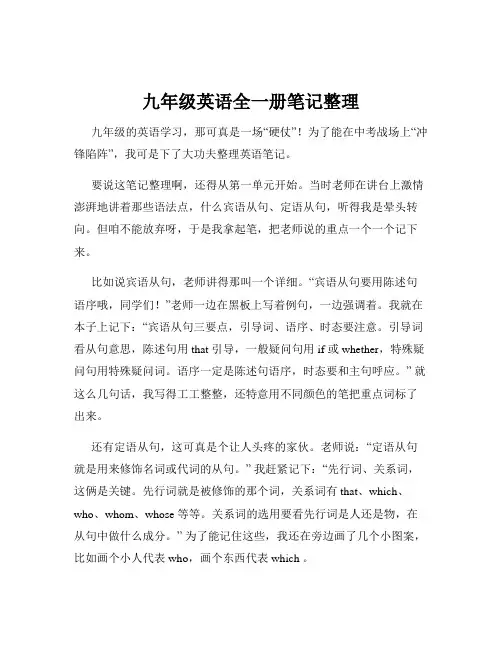
九年级英语全一册笔记整理九年级的英语学习,那可真是一场“硬仗”!为了能在中考战场上“冲锋陷阵”,我可是下了大功夫整理英语笔记。
要说这笔记整理啊,还得从第一单元开始。
当时老师在讲台上激情澎湃地讲着那些语法点,什么宾语从句、定语从句,听得我是晕头转向。
但咱不能放弃呀,于是我拿起笔,把老师说的重点一个一个记下来。
比如说宾语从句,老师讲得那叫一个详细。
“宾语从句要用陈述句语序哦,同学们!”老师一边在黑板上写着例句,一边强调着。
我就在本子上记下:“宾语从句三要点,引导词、语序、时态要注意。
引导词看从句意思,陈述句用 that 引导,一般疑问句用 if 或 whether,特殊疑问句用特殊疑问词。
语序一定是陈述句语序,时态要和主句呼应。
” 就这么几句话,我写得工工整整,还特意用不同颜色的笔把重点词标了出来。
还有定语从句,这可真是个让人头疼的家伙。
老师说:“定语从句就是用来修饰名词或代词的从句。
” 我赶紧记下:“先行词、关系词,这俩是关键。
先行词就是被修饰的那个词,关系词有 that、which、who、whom、whose 等等。
关系词的选用要看先行词是人还是物,在从句中做什么成分。
” 为了能记住这些,我还在旁边画了几个小图案,比如画个小人代表 who,画个东西代表 which 。
单词也是英语学习的重要部分。
每次遇到新单词,我不仅会记下它的拼写、读音和词义,还会把它的用法和相关短语都整理下来。
像“achieve”这个单词,意思是“实现;达到”,我就会写上“achieve one's dream 实现某人的梦想”,还会再补充几个例句,“He achieved great success in his career. 他在事业上取得了巨大的成功。
”“She finally achieved what she wanted. 她最终得到了她想要的。
” 这样一来,看到这个单词,就能想起它的各种用法。
除了语法和单词,阅读理解和写作也是不能忽视的。
九年级人教版英语学习笔记完整版
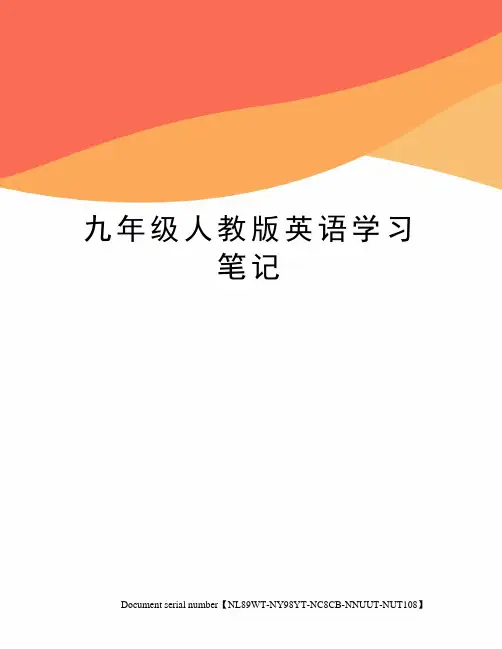
九年级人教版英语学习笔记Document serial number【NL89WT-NY98YT-NC8CB-NNUUT-NUT108】Unit1Howcanwebecomegoodlearners1、How引导的特殊疑问句:①询问方式或手段:“怎样”如:HowdoyoustudyEnglish?---Istudybyreadingaloud.②用于彼此间打招呼、问候、询问身体状况:如:Howdoyoudo---HowdoyoudoHowareyou---I’mfine/well/Ok.③询问天气或程度:如:How’stheweather=What’stheweatherlike?----It’ssunny/cloudy/raining.④询问年龄:如:Howoldisshe=What’sherage?---Sheis15(yearsold)⑤征求意见或建议用:Howabout=Whatabout+n/代词/V-ing.如:Howabout_______(play)basketball?⑥询问频率用:Howoften如:Howoftendoyouexercise---Onceaday.⑦询问可数名词的数量用:Howmany如:Howmanystudentsarethereinyourclass?---Thereare50studentsinourclass⑧询问不可数名词的数量用:Howmuch.如:Howmuchmeat____(be)thereinthefridge?---Onlyalittle.此外:Howmuch还可以用于询问价格。
Howmuchisyourcoat---It’s50yuan.注:询问价格用:Howmuchis/aresth=What’sthepriceofsth东西有贵(expensive=dear)贱(cheap=inexpensive),价格(price)有高(high)低(low)如:Thiscoatisverycheap. Thepriceofthiscoatisverylow.⑨询问次数用:Howmanytimes“多少次”如:Howmanytimesdoyougototheparkaweek?----Threetimes.⑩询问长度、时间长短用:Howlong如:Howlongistheboat----About3meters.Howlongwillyoustaythere?---For2days注:用Howlong提问,用:For+时间段或since+时间点回答(其中,for可以省略)。
[全]人教版初中英语九年级全一册知识点归纳总结
![[全]人教版初中英语九年级全一册知识点归纳总结](https://uimg.taocdn.com/c5e4e5df25c52cc58ad6be4a.webp)
人教版初中英语九年级全一册知识点归纳总结Unit1 How can we become good learners?一、重点短语1. have conversation with sb. 同某人谈话2. too…to…太……而不能3. the secret to………的秘诀4. be afraid of doing sth./ be afraid to do sth. 害怕做某事5. look up 查阅6. repeat out loud 大声跟读7. make mistakes in 在……方面犯错误8. connect ……with…把……和……连接/联系起来9. get bored 感到厌烦10. be stressed out 焦虑不安的11. pay attention to 注意;关注12. depend on 取决于;依靠13. the ability to do sth.. 做某事的能力二、考点详解1. by + doing 通过……方式(by是介词,后面要跟动名词,也就是动词的ing 形式)2. talk about 谈论,议论,讨论The students often talk about movie after class. 学生们常常在课后讨论电影。
talk to sb= talk with sb 与某人说话3. 提建议的句子:①What/ how about +doing sth.? 做…怎么样?(about后面要用动词的ing形式,这一点考试考的比较多)如:What/ How about going shopping?②Why don't you + do sth.? 你为什么不做…?如:Why don't you go shopping?③Why not + do sth. ? 为什么不做…?如:Why not go shopping?④Let's + do sth. 让我们做…...吧。
九年级全一册英语知识点归纳
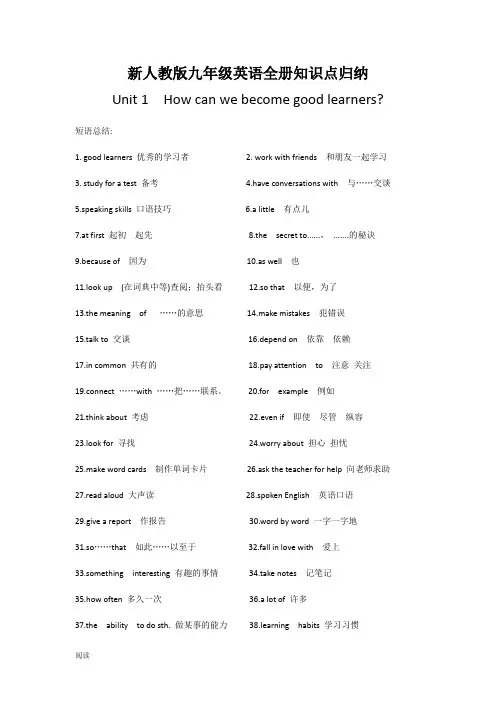
新人教版九年级英语全册知识点归纳Unit 1 How can we become good learners? 短语总结:1. good learners 优秀的学习者2. work with friends 和朋友一起学习3. study for a test 备考4.have conversations with 与……交谈5.speaking skills 口语技巧6.a little 有点儿7.at first 起初起先8.the secret to......,.......的秘诀9.because of 因为10.as well 也11.look up (在词典中等)查阅;抬头看12.so that 以便,为了13.the meaning of ……的意思14.make mistakes 犯错误15.talk to 交谈16.depend on 依靠依赖17.in common 共有的18.pay attention to 注意关注19.connect ……with ……把……联系。
20.for example 例如21.think about 考虑22.even if 即使尽管纵容23.look for 寻找24.worry about 担心担忧25.make word cards 制作单词卡片26.ask the teacher for help 向老师求助27.read aloud 大声读28.spoken English 英语口语29.give a report 作报告30.word by word 一字一字地31.so……that 如此……以至于32.fall in love with 爱上33.something interesting 有趣的事情34.take notes 记笔记35.how often 多久一次36.a lot of 许多37.the ability to do sth. 做某事的能力38.learning habits 学习习惯39.be interested in 对……感兴趣40.get bored 感到无聊41.be good at 在……方面擅长42.be afraid of 害怕43.each other 彼此互相44.instead of 代替而不是二.用法集萃1. by doing sth. 通过做某事2.it +be+adj+to do sth. 做某事是……的3.finish doing sth. 完成某事4.what about doing sth.?做某事怎么样?4.try to do sth. 尽力做某事 6.the +比较近,the+比较近越……,就越……7.find it+adj+to do sth. 发现做某事8. be afraid of doing sth. 害怕做某事9.help sb (to) do sth 帮助某人做某事10.practice doing sth 练习做某事11.keep doing sth 一直做某事12.be afraid to do sth 害怕做某事13.begin to do sth 开始做某事14.want to do sth 想要做某事15.need to do sth 需要做某事16.remember to do sth 记得做某事17.shoot 射(射着,射死等表结果)18.shoot at(瞄准)射书面表达(一)假如你是张晓华,下面是你的笔友李军给你写的一封电子邮件。
九年级上册英语人教版笔记
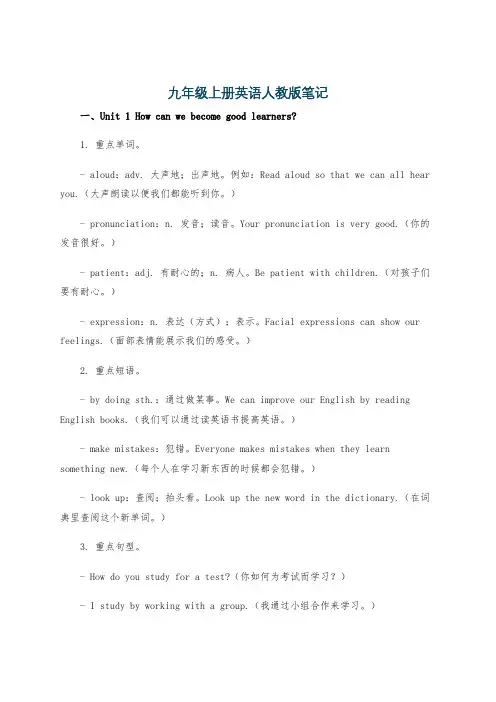
九年级上册英语人教版笔记一、Unit 1 How can we become good learners?1. 重点单词。
- aloud:adv. 大声地;出声地。
例如:Read aloud so that we can all hear you.(大声朗读以便我们都能听到你。
)- pronunciation:n. 发音;读音。
Your pronunciation is very good.(你的发音很好。
)- patient:adj. 有耐心的;n. 病人。
Be patient with children.(对孩子们要有耐心。
)- expression:n. 表达(方式);表示。
Facial expressions can show our feelings.(面部表情能展示我们的感受。
)2. 重点短语。
- by doing sth.:通过做某事。
We can improve our English by reading English books.(我们可以通过读英语书提高英语。
)- make mistakes:犯错。
Everyone makes mistakes when they learn something new.(每个人在学习新东西的时候都会犯错。
)- look up:查阅;抬头看。
Look up the new word in the dictionary.(在词典里查阅这个新单词。
)3. 重点句型。
- How do you study for a test?(你如何为考试而学习?)- I study by working with a group.(我通过小组合作来学习。
)- The more you read, the faster you'll be.(你读得越多,你就会读得越快。
)二、Unit 2 I think that mooncakes are delicious!1. 重点单词。
Unit5笔记人教版英语九年级全册
Unit 5知识梳理总结【词汇梳理】coin(n.硬币)→Every coin has two sides. 凡事都有两面性。
glass(n.玻璃,不可数名词)→glasses(pl. 玻璃杯,可数名词)→a glass of milk一杯牛奶→a pair of glasses一副眼镜produce(v.生产;制造)→ product (n. 产品;制品)→ production (n. 生产)wide(adj.宽的)→ widely (adv. 广泛地;普遍地)→width(n.宽度;广度)France(法国)→ French (adj. 法国的;法国人的)boss(n.老板;上司)→ bosses (pl.)leaf(n.叶;叶子)→ leaves (pl.)grass(n.草地;草坪)→keep off the grass勿踏草坪Germany(n.德国)→ German (adj. 德国的;德语的;n. 德语;德国人)→ Germans (pl.)plete (v.完成)→pletely (adv.)form(n.形式;类型;使形成)→form a good habit养成好习惯fair(n.展览会;交易会)→(adj.公平的)→unfair( 反义adj.不公平的)【短语归纳】be made of... 由.....制成(能看出原材料)be made from... 由.....制成(看不出原材料)be made in... 在......制造be known /famous/wellknown for... 以......闻名be known /famous/wellknown as... 作为......而出名be known /famous/wellknown to... 为......所熟知as far as I know据我所知by hand手工avoid doing sth. 避免做某事no matter无论find out查明;弄清turn...into...将......变成......send out发送;发出be covered with覆盖着paper cutting剪纸【考点总结】1.be famous for,be famous as, be famous to①be famous for... 意为“因......而闻名”,后接原因,通常是名词。
九年级全一册英语第五单元笔记
九年级全一册英语第五单元笔记****1. 嘿,宝子们!这九年级全一册英语第五单元可太有趣啦。
就像打开了一扇通往新英语世界的大门。
比如说单词部分,里面好多新单词就像一群神秘的小怪兽,等着咱们去征服呢。
像“belong”这个词,它的用法就有点小特别,你不能直接说“it belong to me”,得是“it belongs to me”,就像每个人都有自己专属的小窝,这个单词也有它自己专属的用法规则哦。
2. 还有啊,第五单元的语法。
那感觉就像是在搭建一座语言的大厦,而语法就是大厦的框架。
被动语态在这单元可重要啦。
我记得我和同桌讨论的时候,他还迷糊着呢。
我就跟他说:“你看,当我们想说‘这个蛋糕被我吃了’,你要是说成‘I eat the cake’就不对啦,得是‘The cake was eaten by me’,这就像一个东西被别人动了,要把它放在被动的位置上,而不是像个小霸王似的主动出击。
”3. 第五单元的课文内容也超级吸引人呢。
那些故事里的人物啊,就像是我的朋友一样。
我读到他们的经历时,就感觉自己也在故事里。
有个句子我印象特别深,“There must be something visiting the homes in our neighborhood.”这里的“visiting”用法可酷了,就像有个神秘的小访客在街区的房子里穿梭,它不是一个简单的动词形式,而是带着一种正在进行的神秘感觉呢。
4. 宝子们,你们知道吗?这单元的听力部分就像一场小小的冒险。
我和小组的伙伴们一起练习听力的时候,就像在探索一个未知的领域。
有时候那些声音就像小精灵一样,一闪而过。
比如说听到关于谁拥有某个东西的描述,就得快速反应是用主动还是被动语态。
就像在迷宫里找出口一样,得眼疾耳快呢。
5. 咱再说说阅读部分。
那些文章啊,就像是一幅幅画卷在我眼前展开。
我在阅读的时候,感觉自己像是一个探险家,在文字的海洋里寻找宝藏。
其中有篇文章里有这样一句话“He might be running to catch the bus.”这个“might be running”的用法就像是给句子注入了活力,让我能想象到那个人匆匆忙忙跑向公交车的样子,多生动呀。
人教版九年级英语超级笔记(全一册)
Unit 1 How can we become goodlearners?Section A1.ask…for 请求,询问,向…要eg He asked me politely for the book.ask sb (not) to do sth 叫某人(不)做某事2.by prep. 通过…靠…(后接Ving)eg She learns English by English magazines.3.conversation cn 交谈,会话(have conversations with sb)eg I’ll have a long conversation with her.4.aloud adv. 出声地,大声地(常与read,think,cry,shout等连用,表示让人能听得见)loud adj/adv 响亮的/地,大声的/地(指发音音量大或声音穿得远,做adv 时常与speak,talk, laugh等连用)loudly adv. 大声地(表示声音高且喧闹、不悦耳或令人感到讨厌,常与knock,ring,crow连用)eg Look at the sign---“No one is allowed to read aloud in the library.He makes loud noise.Someone knocked loudly at the door.5.practice v. 练习,操练(practice doing sth)practice un 实践,练习,锻炼eg He practices playing football.Practice makes perfect.6.too+adj/adv原形+to+V原形=so+adj/adv原形+that从句=not+adj/adv原形+enough+to+V原形eg He is too young to go to school.=He is so young that he can’t go to school.=He isn’t old enough to go to school.7.spoken English 英语口语eg His spoken English is not so good as his written English.8.quickly adv. 快地,迅速地(指具体的动作迅速敏捷,也指思维反应快)fast adj/adv 快的/地(指物体或人的运动速度快,也指说话快)soon adv 快速地(指动作完成或离现在的时间间隔短)eg Come quickly,something terrible has happened.She drives very fast.My father will leave for Beijing soon.9.word by word 逐字地day by day 日复一日one by one 逐个10.patient adj 有耐心的,耐烦的(be patient with/to…对…有耐心)n 病人eg We all like Mr.Smith.He is very patient with us.The nurse is looking after the patient.11.not…everything 表示部分否定,could not understand everything “并非每件事都能理解”当every,all,always等表示整体意义的词与not连用时,表示部分否定eg I didn’t find everyone on the playground.Not all balls are round in the USA.12.secret cn 秘密,机密(keep a secret保密;in secret秘密地)adj 秘密的,隐秘的eg Exercising every day is the secret of health.It’s a secret passage.13.look up (在字典或资料中)查找;向上看,仰视eg I’ve forgotten the number,you should look it up again.They looked up,and found many locusts.14.repeat =do or say…again15.take a note/take notes 记笔记16.memorize v 记忆,记住(指有意识地用心地去记,强调主观的动作过程memory nremember v 记得(指某件事或印象在记忆里,一般不需要有意识地去记忆便可以想起)eg She tried to memorize every event.She remembered event that happened in these years.17.be afraid of doing sth 担心而害怕做某事be afraid to do sth 怕而不敢做某事eg The girl was afraid to go across the bridge,for she was afraid of falling downfrom it.Section B1.increase to 增到,增加到(后+总数)eg The population of this city has increased to 3,000,000by now.increase by 以…的幅度增加,增加了…eg The population of this factory increased by 10 percent last year.2.at the speed of 以…速度at top/full/high speed 高速,全速eg Your taxi traveled at the speed of 80 miles an hour.It’s dangerous to turn round the corner at high speed.3.be born 出身于be born with 天生具有…be born to do sth 天生能做某事eg He was born in a small village.Her cousin brother was born with a mole(胎记) on the shoulder.Man was born to cry,so it’s with other animals.4.have the ability to do sth 有能力做某事eg Jenny is the first person for the job,she has the ability to communicate.5.take an interest in=be interested in 对…感兴趣lose interest in 对…失去兴趣eg She seems to take an interest in discussing the trip.He has lost interest in fishing.6.create v 创造,创建,创作creative adj 创造性的,有创意的creation n 创造,创建7.It’s +adj +for sb to do sth 对某人来说做某事是……It’s +adj +of sb to do sth (adj是表示情感,特征的词:kind ,nice ,good ,silly ,wrong ,wise等) eg It’s hard for you to finish it.It’s kind of you to say so.8.pay attention to 注意…留心…(to是介词,后接n/pron/Ving)eg Your spoken English is a little poor.Please pay attention to it.As you see,Sam didn’t pay much attention to watching TV.9.connect…with…把…和…连接起来connect…to…把…连上eg First,the light is connected to a switch.Don’t connect the matter with what happened last week.10.even if =even though即使,纵然eg I wouldn’t give up even if I should fail a second time.I can still remember even though it happened so long ago.11. unless=if…not…如果不,除非eg You’ll be late unless you hurry.=You’ll be late if you don’t hurry.Unit 2 I think mooncakes are delicious!Section A1.a little too 太……一点eg Kevin was a little too young to dress himself.2.put on 增加(体重)发胖+weight穿上,戴上+衣物eg Last month,Joan put on some weight.Mr.Weevers put on his hat and hurried out.3.pound cn 重量单位“磅”.货币单位“英镑”eg two pounds of milkAfter the Sichuan earthquake,the British government gave away1,000,000 pounds. 4.shoot down 击落,击毁eg An US UA V was shot down in Iran last year.5.try to do sth 尽力做某事(但不一定成功).try doing sth 尝试做某事eg She tried to climb onto the bank(河岸),but failed.You always travel by train,why not try taking a bus for a change?6.steal 偷,窃取(stole stolen). steal sth from 从……偷某物eg The child stole a book from the shelf..have sth stolen 某物被偷eg She had her purse(钱包)stolen.7.so……that……如此……以至于…….so+adj/adv+that从句.so+adj+a/an+单数名词+that从句.so+many/few+复数名词+that从句.so+much/little+不可数名词+that从句eg He is so young that he can’t go to school.He made so many mistakes that he failed the exam..such……that……如此……以至于…….such+a/an+单数名词+that从句.such+复数名词/不可数名词+that从句.such+a/an+adj+n+that从句.such+adj+复数名词/不可数名词+that从句eg He is such a good student that we all believe him.It was such bad weather that we had to stay at home.y v 平放,放置(lay out 摆开,布置)产卵,下蛋eg Mrs,Turner laid out the flowerpots in her garden.How strange it is to see the hen lay two eggs a day!lie----lying----lay----lain 躺,位于lie----lying----lied----lied 撒谎lay----laying----laid----laid 平放,产卵9.admire vt 欣赏,观赏(admire sth 欣赏某物)Vt 钦佩,羡慕(admire……for……因……而钦佩……)eg Standing on the top of the mountain,you can admire the beauty of the whole city.We admire Ann for her courage.10.tie cn 领带(a shirt and tie). v 拴,扎,系,绑(tie…to…将…拴到…)eg It’s formal(正式)to wear a shirt and tie if you go to a party.Please tie your dog to the tree.11.感叹句的种类How引导的感叹句(1)How+adj+主语+谓语!(2)How+adv+主语+谓语!(3)How+adj+a/an+单数名词+主语+谓语!(4)How+主语+谓语!eg How blue the sky is!How well she danced that day!How interesting a book it is!How time flies!What引导的感叹句(1)What+a/an+单数名词+主语+谓语!(2)What +不可数名词+主语+谓语!(3)What+复数名词+主语+谓语!(4)What+a/an+adj+单数名词+主语+谓语!(5)What+adj+不可数名词+主语+谓语!(6)What+adj+复数名词+主语+谓语!eg What a horse it is!What fun it was!What colors they are!What a nice girl she is!What fine weather it was last week!What silly questions they are.Section B1.trick cn 恶作剧,闹剧(play a trick on sb 捉弄某人)eg The kids played tricks on Harvey when he was young.2.treat cn 招待,款待v 对待,把…看作(treat…as…把…看作…) eg It’s my treat.Don’t treat his words as a joke.3.dress up as+sb 装扮成某人dress up in+服装或颜色穿上…eg The kids are dressing up as pirates(海盗)Father Christmas often dresses up in red.4.mean adj 小气的,吝啬的,自私的(be mean with…对…吝啬)v 意味着,意欲mean doing sth 意味着做某事mean to do sth 打算做某事not mean to do sth 不是有意做某事eg Mr.Marley was mean with almost everything.That would mean wasting a lot of labor.Really?I don’t mean to waste any labor.I don’t mean to be late ,sir.5. business un 商业,生意.un 职责,事务,事(on business 出差).cn 商铺,商店eg Sometimes,business English is hard to learn.Mr.Wang has gone to Hainan Island on business.She has a business in Paris.5.punish sb for (doing) sth 因为(做)某事而处罚某人eg He was punished for breaking the school rules.6.warn sb of sth 警告某人某事warn sb (not) to do sth 警告某人(不)做某事warn sb +that从句eg We’ve warned the kids of the risk of electricity.We’ve been warned not to go out these days.I warned her that snakes are dangerous.7. end up doing sth 最终成为…结果为…eg I didn’t like it at first,but we ended up cheering.end up with 以…告终eg Their game ended up with a quarrel.7.present un 现在,目前(at present).cn 礼物赠品.adj 现在的,目前的.出席的,到场的eg At present,everything goes well.My uncle sent me an iPad as a birthday present.What do you think of your present company,David?The present guests were all in high spirit.8.spread v/n 传播,蔓延eg The fire spread in a short time.China has successfully controlled the spread of bird flu.(禽流感)9.hiding n 躲藏,隐藏处(in hiding 躲藏着;go into hiding 躲起来)eg Tom and his sister went into hiding when they heard the sound of their mother’s footsteps.10.hunt n 搜索,搜寻(hunt for)eg The hunt for the sunk ship(沉船) continue11.not only…but also…不但…而且…(连接两个相对称的并列成分,若连接两个主语时要实行就近原则)eg Not only Mr.lin bt also his son loves the movies.Unit 3 Could you please tell me wherethe restrooms are?Section Armation un 消息(表示通过打听、学习、观察等方式获得的资料).news un 新闻,消息(指人们感兴趣的或近来发生的事情,尤指通过广播、电视、报纸等事情).message cn 消息,口信(指口头或书信传递给他人的消息)eg We need some information.He often sends me short messages.We listen to the news on the radio.2.Could you please+V原形…….?请你…….好吗?.Could you please not+V原形……? 请你不要……好吗?(其回答中不能用could,只能用can.即Yes,I can.或No/Sorry,I can’teg Could you please be here a little earlier?Sorry,I can’t.3.beside prep 在旁边,在附近=next to/close tobesides prep 除…之外还…eg A girl is standing beside the tree.Dis anyone else come besides Jack?4.get sb sth=get sth for sb(get是“买到,弄到,得到”之意)eg Who’d like to get some chalk for me?=Who’d like to get me some chalk?5.pardon v 原谅(主要用于没听清对方说话时,恳请对方再说一遍).excuse me 打扰一下(主要用于吸引别人的注意,有麻烦或打扰之意所做之事可能会使别人不愉快或不方便,诸如插话、失陪、提出请求、纹路等)eg Can I ask you some questions?Pardon?Excuse me,can you tell me where the bank is?6.need v 需要(实义动词)need to do sth 需要去做某事need doing sth 需要被做某事eg Harold needed to bring drinks.Potatoes need cooking a little longer.7.suggest v 使人想到,使人联想,提议,建议suggest sth (to sb)=suggest (to sb) (向某人)提议/建议…suggest doing sth 提议/建议做某事suggest +that从句(虚拟语气,其谓语用should+动词原形,should常被省略)eg What did you suggest to the manager?I suggested going home at once.I suggest (that) we go out to eat.8. psaa by 经过,路过,从…旁边经过.go by 流逝,过去eg He passed by without greeting me.Time goes by.8.宾语从句(2)类型①连词that引导的宾语从句由陈述句转化而来,that无意义,that可省略eg I think (that) she’ll be back soon.He didn’t know (that) his brother was also there.that在下列情况中不宜省略主句与宾语从句间有插入语eg She said here,in her letter,that she was getting on well with her studies.出现两个或以上的宾语从句,此时只有第一个that可以省略,其余的不能省略eg Danny told me (that) he would go to Canada and that he had been there once.②连词代词who,whom,what,which,whose和when, where,why,how等引导的宾语从句由特殊疑问句转化而来,这些连接代词或连接副词在宾语从句中充当某个成分,因此不能省略。
英语人教版九年级全一册笔记
英语人教版九年级全一册笔记以下为您生成 20 个关于人教版九年级全一册的英语笔记示例,包含英语释义、短语、单词、用法和双语例句:---## 1. “achieve”- 英语释义:to successfully complete something or get a good result, especially by working hard- 短语:achieve one's goal 实现目标- 用法:其后常接名词或动词的 -ing 形式- 双语例句:- He achieved his dream of becoming a doctor. (他实现了成为医生的梦想。
)- She has achieved great success in her career. (她在事业上取得了巨大的成功。
)## 2. “ancient”- 英语释义:belonging to a time long ago in history- 短语:ancient history 古代历史;ancient civilization 古代文明- 用法:通常用于形容与过去久远时期相关的事物- 双语例句:- The ancient building is very beautiful. (这座古建筑非常漂亮。
) - Ancient Egyptians were very skilled in building. (古埃及人在建筑方面技艺精湛。
)## 3. “attention”- 英语释义:notice, thought, or care- 短语:pay attention to 注意;draw attention 引起注意- 用法:“pay attention to” 后接名词、代词或动名词- 双语例句:- Please pay attention to your spelling. (请注意你的拼写。
)- His strange behavior drew attention. (他奇怪的行为引起了注意。
- 1、下载文档前请自行甄别文档内容的完整性,平台不提供额外的编辑、内容补充、找答案等附加服务。
- 2、"仅部分预览"的文档,不可在线预览部分如存在完整性等问题,可反馈申请退款(可完整预览的文档不适用该条件!)。
- 3、如文档侵犯您的权益,请联系客服反馈,我们会尽快为您处理(人工客服工作时间:9:00-18:30)。
Unit 1 How can we become goodlearners?Section A1. ask⋯for 请求,询问,向⋯要eg He asked me politely for the book.ask sb (not) to do sth 叫某人(不)做某事2. by prep. 通过⋯靠⋯(后接Ving)eg She learns English by English magazines.3. conversation cn 交谈,会话(have conversations with sb)eg I’l l have a long conversation with her.4. aloud adv. 出声地,大声地(常与read,think,cry,shout 等连用,表示让人能听得见)adv loud adj/adv 响亮的/地,大声的/地(指发音音量大或声音穿得远,做时常与speak,talk, laugh 等连用)loudly adv. 大声地(表示声音高且喧闹、不悦耳或令人感到讨厌,常与knock,ring,crow 连用)eg Look at the sign--- “N o one is allowed to read aloud in the library.He makes loud noise.Someone knocked loudly at the door.5. practice v. 练习,操练(practice doing sth)practice un 实践,练习,锻炼eg He practices playing football.Practice makes perfect.6. too+adj/adv 原形+to+V 原形=so+adj/adv 原形+that 从句=not+adj/adv 原形+enough+to+V 原形eg He is too young to go to school.=He is so young that he can ’t go to school.=He isn ’t old enough to go to school.7. spoken English 英语口语eg His spoken English is not so good as his written English.8. quickly adv. 快地,迅速地(指具体的动作迅速敏捷,也指思维反应快)fast adj/adv 快的/地(指物体或人的运动速度快,也指说话快)soon adv 快速地(指动作完成或离现在的时间间隔短)eg Come quickly,something terrible has happened.She drives very fast.My father will leave for Beijing soon.9. word by word 逐字地day by day 日复一日one by one 逐个10. patient adj 有耐心的,耐烦的(be patient with/to ⋯对⋯有耐心)n 病人eg We all like Mr.Smith.He is very patient with us.The nurse is looking after the patient.11. not⋯everything 表示部分否定,could not understand everything “并非每件事都能理解”not 连用时,表示部分否定当every,all,always 等表示整体意义的词与eg I didn t f’i nd everyone on the playground.Not all balls are round in the USA.12. secret cn 秘密,机密(keep a secret保密;in secret 秘密地)adj 秘密的,隐秘的eg Exercising every day is the secret of health.It’s a secret passage.13. look up (在字典或资料中)查找;向上看,仰视eg I’v e forgotten the number,you should look it up again.They looked up,and found many locusts.14. repeat =do or say⋯again15. take a note/take notes 记笔记16. memorize v 记忆,记住(指有意识地用心地去记,强调主观的动作过程memory nremember v 记得(指某件事或印象在记忆里,一般不需要有意识地去记忆便可以想起)eg She tried to memorize every event.She remembered event that happened in these years.17. be afraid of doing sth 担心而害怕做某事be afraid to do sth 怕而不敢做某事eg The girl was afraid to go across the bridge,for she was afraid of falling downfrom it.Section B1. increase to 增到,增加到(后+总数)eg The population of this city has increased to 3,000,000by now.increase by 以⋯的幅度增加,增加了⋯eg The population of this factory increased by 10 percent last year.2. at the speed of 以⋯速度at top/full/high speed 高速,全速eg Your taxi traveled at the speed of 80 miles an hour.It’s dangerous to turn round the corner at high speed.3. be born 出身于be born with 天生具有⋯be born to do sth 天生能做某事eg He was born in a small village.Her cousin brother was born with a mole( 胎记) on the shoulder.Man was born to cry,so it ’s with other animals.4. have the ability to do sth 有能力做某事eg Jenny is the first person for the job,she has the ability to communicate.5. take an interest in=be interested in 对⋯感兴趣lose interest in 对⋯失去兴趣eg She seems to take an interest in discussing the trip.He has lost interest in fishing.6. create v 创造,创建,创作creative adj 创造性的,有创意的creation n 创造,创建7. It’s +adj +for sb to do sth 对某人来说做某事是⋯⋯It’s +adj +of sb to do sth (adj 是表示情感,特征的词:kind ,nice ,good ,silly ,wrong ,wise 等) eg It ’s hard for you to finish it.It’s kind of you to say so.8. pay attention to 注意⋯留心⋯(to 是介词,后接n/pron/Ving )eg Your spoken English is a little poor.Please pay attention to it.As you see,Sam didn’t pay much attention to watching TV.9. connect⋯with⋯把⋯和⋯连接起来connect⋯to⋯把⋯连上eg First,the light is connected to a switch.Don’t connect the matter with what happened last week.10. even if =even though 即使,纵然eg I wouldn ’t give up even if I should fail a second time.I can still remember even though it happened so long ago.11. unless=if⋯not⋯如果不,除非eg You’l l be late unless you hurry.=You’l l be late if you don ’t hurry.Unit 2 I think mooncakes are delicious!Section A1.a little too 太⋯⋯一点eg Kevin was a little too young to dress himself.2.put on 增加(体重)发胖+weight穿上,戴上+衣物eg Last month,Joan put on some weight.Mr.Weevers put on his hat and hurried out.3.pound cn 重量单位“磅”.货币单位“英镑”eg two pounds of milkAfter the Sichuan earthquake,the British government gave away1,000,000 pounds.4.shoot down 击落,击毁eg An US UA V was shot down in Iran last year.5.try to do sth 尽力做某事(但不一定成功).try doing sth 尝试做某事eg She tried to climb onto the bank( 河岸),but failed.You always travel by train,why not try taking a bus for a change?6.steal 偷,窃取(stole stolen). steal sth from 从⋯⋯偷某物eg The child stole a book from the shelf..have sth stolen 某物被偷eg She had her purse(钱包)stolen.7.so⋯⋯that⋯⋯如此⋯⋯以至于⋯⋯.so+adj/adv+that 从句.so+adj+a/an+单数名词+that 从句.so+many/few+ 复数名词+that 从句.so+much/little+ 不可数名词+that 从句eg He is so young that he can’t go to school.He made so many mistakes that he failed the exam..such⋯⋯that⋯⋯如此⋯⋯以至于⋯⋯.such+a/an+单数名词+that 从句.such+复数名词/不可数名词+that 从句.such+a/an+adj+n+that 从句.such+adj+复数名词/不可数名词+that 从句eg He is such a good student that we all believe him.It was such bad weather that we had to stay at home.y v 平放,放置(lay out 摆开,布置)产卵,下蛋eg Mrs,Turner laid out the flowerpots in her garden.How strange it is to see the hen lay two eggs a day!lie----lying----lay----lain lie----lying----lied----lied lay----laying----laid----laid 躺,位于撒谎平放,产卵9.admire vt 欣赏,观赏(admire sth 欣赏某物)Vt 钦佩,羡慕(admire⋯⋯for⋯⋯因⋯⋯而钦佩⋯⋯)eg Standing on the top of the mountain,you can admire the beauty of the whole city.We admire Ann for her courage.10.tie cn领带( a shirt and tie ). v 拴,扎,系,绑(tie⋯to⋯将⋯拴到⋯)eg It’s formal(正式)to wear a shirt and tie if you go to a party.Please tie your dog to the tree.11.感叹句的种类How 引导的感叹句(1) How+adj+ 主语+谓语!(2) How+adv+ 主语+谓语!(3) How+adj+a/an+ 单数名词+主语+谓语!(4) How+ 主语+谓语!eg How blue the sky is!How well she danced that day!How interesting a book it is!How time flies!What 引导的感叹句(1) What+a/an+单数名词+主语+谓语!(2) What + 不可数名词+主语+谓语!(3) What+复数名词+主语+谓语!(4) What+a/an+adj+ 单数名词+主语+谓语!(5) What+adj+ 不可数名词+主语+谓语!(6) What+adj+ 复数名词+主语+谓语!eg What a horse it is!What fun it was!What colors they are!What a nice girl she is!What fine weather it was last week!What silly questions they are.Section B1. trick cn 恶作剧,闹剧(play a trick on sb 捉弄某人)eg The kids played tricks on Harvey when he was young.2. treat cn 招待,款待v 对待,把⋯看作(treat⋯ a s⋯把⋯看作⋯) eg It’s my treat.Don’t treat his words as a joke.3. dress up as+sb 装扮成某人dress up in+服装或颜色穿上⋯eg The kids are dressing up as pirates(海盗)Father Christmas often dresses up in red.4. mean adj 小气的,吝啬的,自私的(be mean with ⋯对⋯吝啬)v 意味着,意欲mean doing sth 意味着做某事mean to do sth 打算做某事not mean to do sth 不是有意做某事eg Mr.Marley was mean with almost everything.That would mean wasting a lot of labor.Really?I don ’t mean to waste any labor.I don’t mean to be late ,sir.5. business un 商业,生意.un 职责,事务,事(on business 出差).cn 商铺,商店eg Sometimes,business English is hard to learn.Mr.Wang has gone to Hainan Island on business.She has a business in Paris.5. punish sb for (doing) sth 因为(做)某事而处罚某人eg He was punished for breaking the school rules.6. warn sb of sth 警告某人某事warn sb (not) to do sth 警告某人(不)做某事warn sb +that 从句eg We’v e warned the kids of the risk of electricity.We’v e been warned not to go out these days.I warned her that snakes are dangerous.7. end up doing sth 最终成为⋯结果为⋯eg I didn ’t like it at first,but we ended up cheering.end up with 以⋯告终eg Their game ended up with a quarrel.7. present un 现在,目前(at present).cn 礼物赠品.adj 现在的,目前的.出席的,到场的eg At present,everything goes well.My uncle sent me an iPad as a birthday present.What do you think of your present company,David?The present guests were all in high spirit.8. spread v/n 传播,蔓延eg The fire spread in a short time.China has successfully controlled the spread of bird flu. (禽流感)9. hiding n 躲藏,隐藏处(in hiding 躲藏着;go into hiding 躲起来)eg Tom and his sister went into hiding when they heard the sound of their mother’s footsteps.10. hunt n 搜索,搜寻(hunt for)eg The hunt for the sunk ship( 沉船) continue11. not only ⋯but also⋯不但⋯而且⋯(连接两个相对称的并列成分,若连接两个主语时要实行就近原则)eg Not only Mr.lin bt also his son loves the movies.Unit 3 Could you please tell me wherethe restrooms are?Section A1. information un 消息(表示通过打听、学习、观察等方式获得的资料).news un 新闻,消息(指人们感兴趣的或近来发生的事情,尤指通过广播、电视、报纸等事情).message cn 消息,口信(指口头或书信传递给他人的消息)eg We need some information.He often sends me short messages.We listen to the news on the radio.2. Could you please+V 原形⋯⋯.?请你⋯⋯.好吗?.Could you please not+V 原形⋯⋯? 请你不要⋯⋯好吗?(其回答中不能用could,只能用can.即Yes,I can.或No/Sorry,I can ’teg Could you please be here a little earlier?Sorry,I can’t.3. beside prep 在旁边,在附近=next to/close tobesides prep 除⋯之外还⋯eg A girl is standing beside the tree.Dis anyone else come besides Jack?4. get sb sth=get sth for sb(get 是“买到,弄到,得到”之意)eg Who’d like to get some chalk for me?=Who ’d like to get me some chalk?5. pardon v 原谅(主要用于没听清对方说话时,恳请对方再说一遍).excuse me 打扰一下(主要用于吸引别人的注意,有麻烦或打扰之意所做之事可能会使别人不愉快或不方便,诸如插话、失陪、提出请求、纹路等)eg Can I ask you some questions?Pardon?Excuse me,can you tell me where the bank is?6. need v 需要(实义动词)need to do sth 需要去做某事need doing sth 需要被做某事eg Harold needed to bring drinks.Potatoes need cooking a little longer.7. suggest v 使人想到,使人联想,提议,建议suggest sth (to sb)=suggest (to sb) (向某人)提议/建议⋯suggest doing sth 提议/建议做某事suggest +that 从句(虚拟语气,其谓语用should+动词原形,should 常被省略)eg What did you suggest to the manager?I suggested going home at once.I suggest (that) we go out to eat.8. psaa by 经过,路过,从⋯旁边经过.go by 流逝,过去eg He passed by without greeting me.Time goes by.8. 宾语从句(2) 类型①连词that 引导的宾语从句由陈述句转化而来,that 无意义,that 可省略eg I think (that) she ’l l be back soon.He didn’t know (that) his brother was also there.that 在下列情况中不宜省略主句与宾语从句间有插入语eg She said here,in her letter,that she was getting on well with her studies.出现两个或以上的宾语从句,此时只有第一个that 可以省略,其余的不能省略eg Danny told me (that) he would go to Canada and that he had been there once.②连词代词who,whom,what,which,whose 和when, where,why,how 等引导的宾语从句由特殊疑问句转化而来,这些连接代词或连接副词在宾语从句中充当某个成分,因此不能省略。
